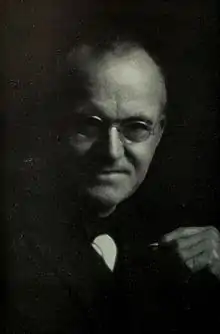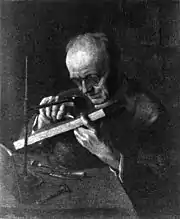Timothy Cole | |
|---|---|
 | |
| Born | 1852 |
| Died | 17 May 1931 (aged 79)[1] |
| Occupation | Engraving[2] |
| Children | Alphaeus Philemon Cole |
.jpg.webp)
Timothy Cole (1852 – 17 May 1931) was an American wood engraver.
Biography
Timothy Cole was born in 1852 in London, England, his family emigrated to the United States in 1858.

He established himself in Chicago,[3] where in the great fire of 1871 he lost everything he possessed. In 1875, he moved to New York City, finding work on the Century (then Scribner's) magazine.[4][5][6] Cole was associated with the magazine for 40 years as a pioneer craftsman of wood engraving.[7]
He immediately attracted attention by his unusual facility and his sympathetic interpretation of illustrations and pictures, and his publishers sent him abroad in 1883 to engrave a set of blocks after the old masters in the European galleries. These achieved for him a brilliant success. His reproductions of Italian, Dutch, Spanish, Flemish and English pictures were published in book form with appreciative notes by the engraver himself.[6] He published his engravings in several books: Old Italian Masters (1892), Old Dutch and Flemish Masters (1895), Old English Masters (1902),[8] and Old Spanish Masters (1907).[7]
Though the advent of new mechanical processes had rendered wood engraving almost a lost art and left practically no demand for the work of such craftsmen, Mr Cole was thus enabled to continue his work, and became one of the foremost contemporary masters of wood engraving. He received a medal of the first class at the Paris Exhibition of 1900, and the only grand prize given for wood engraving at the Louisiana Purchase Exposition at St Louis, Missouri, in 1904.[6] In 1906 he was elected into the National Academy of Design as an Associate Academician, and became a full Academician in 1908.
His son, Alphaeus Philemon Cole, was a noted portraitist who is also today recognized as having been the world's oldest verified living man at the time of his death.
Collections
Bibliography
- Anon (1911). "Timothy Cole: A Biographical Note", The Print Collector’s Quarterly, Vol 1, No. 3, p. 344.
- Cary, Elisabeth Luther (1911). "Timothy Cole and Henry Wolf: Two Masters of Modern Wood-Engraving," The Print Collector’s Quarterly, Vol 1, No. 3, p. 319.
- Cole, Timothy (1911). "Some Difficulties of Wood-Engraving," The Print Collector’s Quarterly, Vol 1, No. 3, p. 335.
- Robert Underwood, Johnson (1918). "Timothy Cole," The Art World, Vol. 3, No. 5, p. 376.
References
- ↑ "Timothy Cole Dies", The New York Times, May 18, 1931.
- ↑ Whittle, George Howes (1918). "The Art of Timothy Cole," The Art World, Vol. 3, No. 5, pp. 377-383.
- ↑ Cole, Alphaeus Philemon & Margaret Ward Walmsley Cole (1935). Timothy Cole: Wood-engraver. The Pioneer Associates, p. 5.
- ↑ "Timothy Cole," The Art World, Vol. 1, No. 1, Oct., 1916, p. 13.
- ↑ Sabine, Julia (1952). "Timothy Cole and the 'Century'," The Library Quarterly, Vol. 22, No. 3, pp. 232-239.
- 1 2 3 Chisholm 1911.
- 1 2 "Timothy Cole". Columbia Electronic Encyclopedia. Retrieved 2 October 2013.
- ↑ "Review of Old English Masters by Timothy Cole". The Athenaeum (3923): 23–24. January 3, 1903.
- ↑ "Timothy Cole". The Art Institute of Chicago. 1852.
- ↑ "Lesson in Horsemanship (1913) by Timothy Cole". Metropolitan Museum of Art (www.metmuseum.org).
- ↑ "Timothy Cole | Smithsonian American Art Museum". americanart.si.edu.
- This article incorporates text from a publication now in the public domain: Chisholm, Hugh, ed. (1911). "Cole, Timothy". Encyclopædia Britannica. Vol. 6 (11th ed.). Cambridge University Press. p. 665.